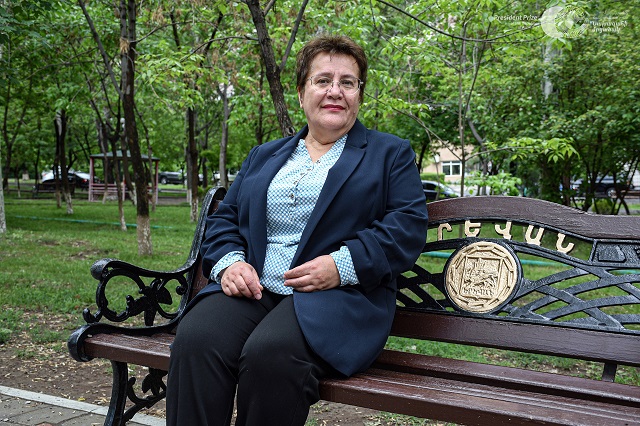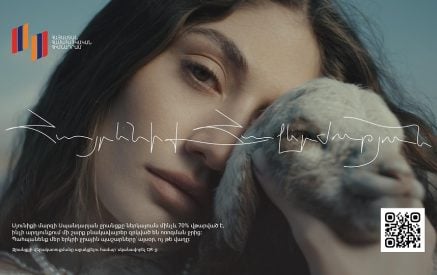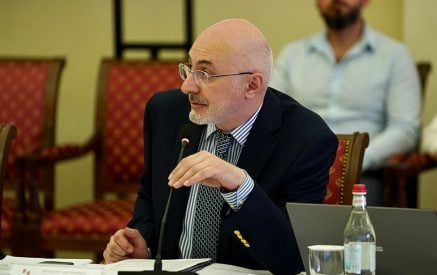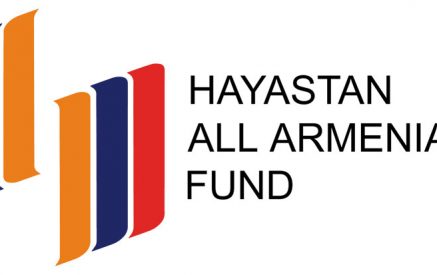“This virus intimidated me. For a moment I thought, what if this virus takes me and I do not write my newly generated novel”. Writer Susanna Harutyunyan is after all not from those who surrender. “No matter how much we complain of the virus, war, tsunamis and floods. Extreme conditions are just artifacts for a writer, they open new horizons for creativity”.
She disagrees with the statement that this pandemic opens new times for literature, nonetheless claims, “Like many others I hope that such a horrible disease will make people reevaluate life, not run amainly after money and well-being, evaluate the spiritual. I hope they will read not for overcoming the nuisances of isolation but for the wish to engage with the universe, knowledge, life experience of the mankind, language”.
She has not been interested in the sales of her books during these months. “Even during the previous years success was not in the bag. I am not one of those writers for whom literary critics or a team work, I do not have people propagating my works or screaming and shouting about them everywhere and anywhere. But to tell the truth, the existence or non-existence of a buyer, reader or literary critic has nothing to do with writing, otherwise no one would write today in Armenia”.
For her days of isolation lasting longer than a whole century started long before the virus. “One day I suddenly felt that writing does not console any more, felt that writing does not dispel the timeless grief of being human. I erased, destroyed quite a lot of new and already complete works. Afterwards I regretted for some works, there were good stories, a novel I had started long time ago, one or two plays, but things were already done. So, from the beginning I isolated from my works, then…”.
Read also
She is always in isolation. By her own wish, or not? “If I am not mistaken Brigitte Bardot said: The more I learn about people the more I love dogs… And my misfortune is that I like neither people nor dogs. I have arrogantly chosen the Almighty, but He does not feel like listening to me”.
Susanna Harutyunyan has published more that a dozen books: novels, novelettes, plays, many of which have been translated into different languages. In 2016 “Ravens before Noah” book (same title novel and the collection of stories “Including the Second Sunday”) received the award of the president of the Republic of Armenia. In the novel “Ravens before Noah” Harut “having fled from Turks” founds, with magical behavior but in fact with nowhere to flee, his own village in Armenia and away from the world’s eye, who at the end disappears in binary uncertainty either in Siberia or under other skies. Varso is one of the companions of the powerful character of Harut, who endlessly tells the same tale to village children. Children grow up but neither the heroes of the tale get older nor the tale ends. The ending is in the spotlight of the villagers. Does the author of the novel know for herself how the tale ends? “Varso’s protracted tale is itself life’s infinity. Unfortunately, I do not know the ending of the tale either. If I knew, I would be an enormously great writer… The character of Varso, again has its prototype. She was also among the emigrants, though had a different name in fact. She was the only woman in the village wearing trousers, by the way she had a family. She used to sit on the stone wall and smoke. Of course, she did not tell tales, but would definitely if she had listeners”.
There are many prototypes in this novel. Harut is the uncle of the author’s grandfather from her father’s side. He was as imperious character as described in the novel. “Emigrants are real. For instance, Nakhshun, from whom I have taken only high-quality blanket and clay items, the fact of constructing tonir, knjru. Fortunately, she had quite different and much better destiny, than the heroine of the novel. Yes, “knjru” type of omelet is real, which I heard from Nakhshun. My mom was extremely taut woman. She used to wash bedding wool, Nakhshun used to come for sewing, and did not eat anything except for knjru. She used to say that other meals make stomach ache. First time when she said knjru, we thought of it as an extraordinary meal, but after preparing we were laughing all day long. These villagers of the novel making fun of and disappointed were us – four children of my mom, who also said that it was just omelet”.
Since the prototype of the protagonist of this novel was in her father’s side, she decided “to be honest” and prototypes of her new novel are going to be her grandfather from mother’s side and elder uncle, both legendary communists. “It’s wrong that when a writer includes autobiographical fact in his/her literature it means he/she has exhausted himself/herself. But why to suffer for composing new things when God serves everything on a silver plate. Can we compose better than him? The writer is to just take life down in shorthand”.
People familiar with Susanna Harutyunyan’s prose often call her “Marquez of Armenian literature”. The reason thereof is the skillful combination of magic and reality. Does she agree with this assessment? “Of course, it is pleasant to be Marquez, but being Shakespeare, Balzac, and also Dostoyevsky would not be bad… Unfortunately, it is not worth hoping so. Our literal environment is able to destroy any genius and boast about its deed”.
She has two sons, three grandchildren and a husband. “Who impede me living with literature and the life and want. But I desperately want to have more grandchildren and want them to continue impeding. I regret not having many children. I also regret not having displayed even one percent of my capabilities. But I do not know whether I would get the charges from life or not, whether I would write the works or not if I were exempt from family worries. Inasmuch as life creates us, doesn’t it? Otherwise I would be one of those mad widows, who still at ninety imagine themselves being a bride, and would write the way Facebook “classics” do”.
Ruzan Khachatryan
The annual award of the president of the Republic of Armenia is initiated and financed by Boghossian Foundation (Belgium- Switzerland). The award is organized by Hayastan All Armenian Fund. The awards are handed over by the president of the Republic and the representative of Boghossian Foundation at the president’s residence.



























































